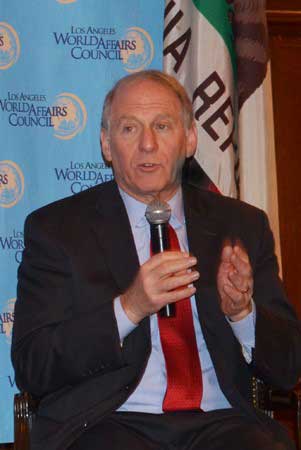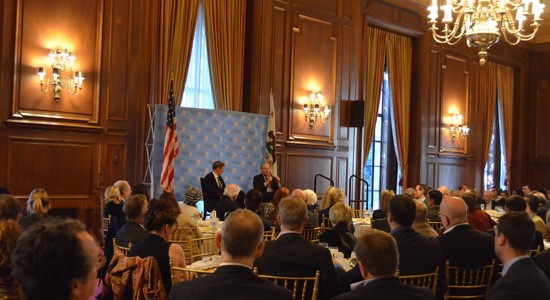
Dr. Richard Haass
The world is in a state of disarray, and the diminishing US role overseas is no small part of that, according to Richard Haass, the President of the Council on Foreign Relations. At a LAWAC breakfast meeting on January 27th, Haass gave a wide-ranging review of the challenges facing the US in the world, and said the early signs were that the incoming administration could further complicate America's global relationships. "There is no doubt the election campaign eroded America's image in the world. And the inaugural speech [of President Trump] gave a very unfortunate message of how he sees the world."
But Haass said that the global world order was in decline long before President Trump's election. "There is a gap between global challenges and global responses," said Haass. For a long time the world was grateful for American leadership, but partly due to intervention fatigue in Iraq and Afghanistan, and partly out of concern about domestic problems, the US had begun to retreat.
"President Obama wanted to dial back, and I think he was dead wrong... and Donald Trump is in the same category. But the problem is that the world will not self-organize. It is going to be a world that unravels." Nowhere is this more evident than in the Middle East, where the lack of an assertive US role has allowed chaos to spread. Calling the Middle East "the least successful part of the world", Haass said the US should avoid two extremes - the Bush approach which led to the invasion of Iraq, and the Obama approach which led to the overly rapid withdrawal from Iraq, both of which Haass said were mistakes.
"You cannot suddenly transform this area with democracy and bring peaceful government to every strip of land," he said. But nor should the US wash its hands of the Middle East, as there is important work to be done in counter-terrorism getting rid of ISIS and figuring out what to do after ISIS, keeping a ceiling on Iran's nuclear program, preventing worse conflict between Israelis and Palestinians and helping ordinary people in Syria. Haass said he does not think much progress can be made in the short term on Israeli-Palestinian peace talks, as neither side has a leader who wants to negotiate. But he said that moving the US Embassy to Jerusalem, while providing no upside for the US, could have significant downside if it ignited conflict between Jews and Palestinians over the holy places on the Temple Mount - a conflict that could incite Muslims across the world.

In discussion with Dr. Richard Haass
Haass also warned of the dangers of the current administration's outreach to Taiwan which could potentially disrupt the One China policy that he says has served to keep the peace and allowed both China and Taiwan to thrive economically since it was first instituted 45 years ago. "Pushing China on Taiwan will not give us any leverage - it will shut down US-China relations." Taiwan, along with Tibet, are issues that no Chinese leader can give any ground on - to do so would mean instant political suicide. Haass said that wrecking US-China relations would be counter-productive for many reasons, not the least of which would be losing any hope of China bringing influence to bear on North Korea. "The single biggest foreign policy challenge facing this administration will be North Korea," which is within a couple of years of building ICBMs with nuclear warheads that could reach Los Angeles. If we do not want outright war with North Korea, China is the only power that could intervene diplomatically. "So we would be scoring an own goal with China. We just scored one with Mexico [demanding Mexico pay for a border wall]. We would score another own goal by moving the US Embassy to Jerusalem. We could go to 5-0 or 6-0 really quickly!"
On Russia, Haass said the US should adopt "a honey and vinegar policy." The US should look for selective areas of cooperation, while at the same time reintroducing military forces into NATO, particularly in the Baltics. The US should also help strengthen Ukraine's defenses. But it will also require some moves by Putin - "he is a one-man band - he has a degree of power we haven't seen since Stalin." Haass says that Putin appears to think we have "a secret plan to unseat him and cause a liberal revolution in Russia." The US should find a way to persuade him that is not the case, and even offer to drop some of the sanctions - provided the Russians give something back in return, notably by limiting their aggressive behavior in Ukraine.
On Europe Haass said that "we have to be careful not to throw the baby out with the bathwater." Despite the shortcomings of the EU, it has served to keep the peace in Europe for 70 years - but now Europe is again in play, due to bad policy decisions by its leaders, the sudden influx of migrants from the Middle East, Putin's aggression and a generalized disaffection with globalization. He said that British Prime Minister David Cameron, who called for the referendum on "Brexit", which would have brought no benefits to his party if they had won, but had tremendous downside, was "not a mistake, but what Bismarck would have called a 'blunder'."
Looking forward, Haass said that because Trump's policies do not fit the orthodox Republican view, "I think we will see increasing distance between Trump and the Republicans, particularly in the Senate." Already Senators Lindsey Graham and John McCain have been critical of some of Trump's announcements, and Haass expects those disagreements to continue.
But underlying much of the populist revolt against the perceived elites in the US and Europe is a deep-seated anxiety about the consequences of globalization. The biggest task facing the US - and many other developed countries - will be helping societies deal better with globalization. One key task will be educating people to make them more globally literate. And that will require Americans to remain open-minded and outward looking, and not to turn inwards and try to ignore the world outside. Which is why we have organizations like the Council on Foreign Relations - and the Los Angeles World Affairs Council.
